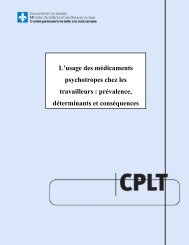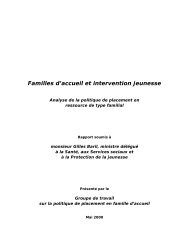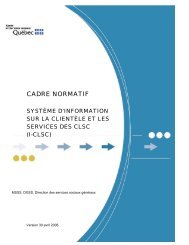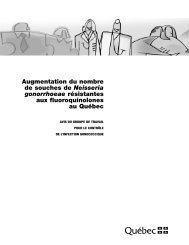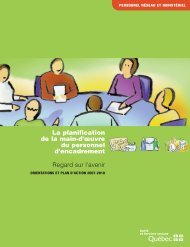De l'innovation au changement - Gouvernement du Québec
De l'innovation au changement - Gouvernement du Québec
De l'innovation au changement - Gouvernement du Québec
You also want an ePaper? Increase the reach of your titles
YUMPU automatically turns print PDFs into web optimized ePapers that Google loves.
Projet 40<br />
Élaboration d’outils de dépistage et d'évaluation <strong>au</strong>près des aidantes<br />
6. POTENTIEL DE GÉNÉRALISATION<br />
6.1 Pérennité Aucune information à ce sujet.<br />
6.2 Conditions nécessaires Actively including stakeholders from conception to evaluation<br />
1.1.3.3 Assuring standardisation<br />
1.1.3.3.1<br />
Workers discussed the dilemma of knowing. Workers felt guilty and frustrated that they were aware of unmet needs but not able to<br />
intervene bec<strong>au</strong>se there are so few services and resources available for caregivers. In fact one site refused to use the tool in the future if<br />
resources and services were not available. For many, the discussion may be described as the ‘ethics of knowing’. After participation in this<br />
project the workers know that there is a need for caregiver services, however, they do not have any services to offer.<br />
Lessons which we learned for successful implementation of agency-based research leading to successful outcomes are : 1) the necessity<br />
of frequent interaction between team members to ensure a common understanding of all the aspects of the project; 2) the importance that<br />
agency-based research be properly implemented including a clear presentation of the roles and responsibilities of the research team, the<br />
agency and the workers; stipends to free staff and the assurance that staff participation is voluntary; 3) the importance of ensuring the<br />
conditions necessary to facilitate caregiver participation such as providing respite; 4) the importance of learning the culture of the agency<br />
and its workers before attempting to intro<strong>du</strong>ce the research and adapting the protocol in line with this culture; 5) the importance of offering<br />
on-going, regular and accessible support and supervision to practician-researchers; 6) the importance of ensuring on-going contact with<br />
agency administrators; 7) the importance of developing user-friendly material which acts as a support to practitioner-researchers; 8) the<br />
importance of helping workers work through the ethical dilemmas posed by the research.<br />
Given the implications of implementing screening and assessment tools, in particular in terms of the financial and human resources<br />
involved, it is clear that the shift to conceptualising caregivers as potential clients and/or partners of home care services must be an agency<br />
priority at all levels.<br />
Given potential worker resistance to added responsibilities and in particular additional screening and assessment tools to administer, intake<br />
workers, assessors, and front-line practitioners must be consulted and included in all implementation decisions from the outset.<br />
Practitioners will have to be trained in line with the new orientations developed by the agency resulting from the new conception of<br />
caregivers and their relation to home care services. Practitioners will need to modify their practice or elements of their practice and thus will<br />
require training on caregivers’ situations and issues and practice skills for meeting the needs of caregivers. As well, they will have to be<br />
trained in the use of the tools and given on-going supervision to ensure standardisation of the interpretation of the scoring codes.<br />
Perhaps the most delicate issue with regard to the future implementation of the tools is that they will, in the short-run at least, require a<br />
financial investment from government, both in terms of the additional human resources needed to support this new group of potential<br />
clients and in terms of developing the services and resources which caregivers need in order to maintain their responsibilities without<br />
un<strong>du</strong>e negative effects to their own well-being.<br />
6.3 Avantages généralisation We can conclude that this is a valid instrument which can predict caregivers at risk for their physical and mental health on a broader level<br />
than other instruments which usually are very long or measure only one or two specific dimensions of risk, such as depression<br />
At this time, there exist only token policy and program efforts at both the national and provincial levels including taxation policies and<br />
volunteer support, with little emphasis on the role of public services with regard to caregivers. This clearly indicates the need for the<br />
development of programs and services addressing caregiver needs. By identifying the underlying c<strong>au</strong>ses of caregiver burden and distress,<br />
the tools created by this project can provide the information necessary to develop specific programs and services which will ensure<br />
caregiver well-being. Their well-being must be of equal priority in the health-care system as the well-being of the disabled persons they





